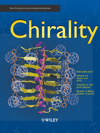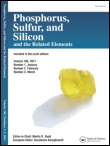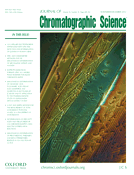
CHIRALITY
metrics 2024
Unveiling the Science Behind Chirality's Impact
Introduction
CHIRALITY is a prominent journal in the field of chemistry, published by Wiley. Established in 1989, it has become a critical resource for researchers and professionals interested in the intricate study of chiral compounds across various applications, including analytical chemistry, catalysis, drug discovery, organic chemistry, pharmacology, and spectroscopy. With an ISSN of 0899-0042 and an E-ISSN of 1520-636X, CHIRALITY currently holds a Q2 ranking in Analytical Chemistry and Q3 rankings in several other categories based on the latest assessments. Although it does not offer open access, the journal is widely recognized for disseminating high-quality research that contributes significantly to our understanding of chirality. Its impact is reflected in its Scopus rankings, indicating the journal's influence and relevance within the broader scientific community. Researchers, students, and professionals alike will find CHIRALITY an invaluable conduit for cutting-edge findings and developments in chirality-related research.
Metrics 2024
 0.44
0.44 2.80
2.80 2.20
2.20 83
83Metrics History
Rank 2024
Scopus
IF (Web Of Science)
JCI (Web Of Science)
Quartile History
Similar Journals

BIOORGANIC & MEDICINAL CHEMISTRY LETTERS
Innovating drug discovery through biochemistry insights.BIOORGANIC & MEDICINAL CHEMISTRY LETTERS, published by PERGAMON-ELSEVIER SCIENCE LTD, is a leading journal in the fields of biochemistry, drug discovery, and medicinal chemistry, designed to disseminate significant advances in these disciplines. Established in 1991, the journal spans various important categories, including Organic Chemistry and Pharmaceutical Science, with its 2023 Scimago Journal Rank placing it at Q2 in Organic Chemistry and Q3 in several other relevant fields. Though not an open-access publication, it provides invaluable insights into contemporary research and innovative methodologies, appealing to researchers, professionals, and students alike. The journal's commitment to quality and relevance makes it a vital resource for those aiming to stay at the forefront of bioorganic and medicinal chemistry developments. For more information, please visit the journal's website as it remains a critical platform for scholarly exchange, particularly for those engaged in interdisciplinary research.

PHOSPHORUS SULFUR AND SILICON AND THE RELATED ELEMENTS
Unlocking the Secrets of Key Chemical ElementsPHOSPHORUS SULFUR AND SILICON AND THE RELATED ELEMENTS, published by Taylor & Francis Ltd, is a distinguished journal dedicated to advancing knowledge in the fields of Biochemistry, Inorganic Chemistry, and Organic Chemistry. Established in 1989, the journal has carved a niche in the scientific community by offering a platform for the publication of innovative research that explores the chemistry and applications of phosphorus, sulfur, silicon, and related elements. With an ISSN of 1042-6507 and an E-ISSN of 1563-5325, this journal provides access to valuable insights, albeit without open access options. Despite being positioned in the fourth quartile of its categories (Q4), it remains an essential resource for researchers, professionals, and students seeking to expand their understanding of these pivotal elements and their interactions. With a publishing horizon extending to 2024, the journal invites contributions aimed at pushing the boundaries of chemistry and fostering interdisciplinary dialogue.

LCGC EUROPE
Connecting researchers to the pulse of chromatographic advancements.LCGC EUROPE is a prominent journal dedicated to the field of analytical chemistry, specifically highlighting the latest trends and innovations in chromatographic techniques. Published by MJH Life Sciences, this journal has served as a valuable resource for researchers, professionals, and students interested in the nuances of laboratory practices and the advancement of instrumentation. Although LCGC EUROPE ceased its coverage in Scopus from 2018, it has maintained a significant influence within the community, evidenced by its Scopus rank of 90/114 in Analytical Chemistry, placing it in the 21st percentile. With its inception dating back to 1996, the journal provided essential insights and peer-reviewed articles, fostering a rich understanding of chromatographic science. While the journal is not currently open access, it remains an integral part of the literature for anyone engaged in the analytical chemistry landscape, especially as it pertains to laboratory methodologies and innovations.

Science China-Chemistry
Fostering Excellence in Chemical Research and EducationScience China-Chemistry, published by SCIENCE PRESS, stands as a leading journal in the field of chemistry, specifically recognized for its contributions in miscellaneous chemistry domains. With an impressive Q1 categorization in the 2023 quartiles and ranking at #35/408 in general chemistry by Scopus, this journal places itself within the top 91st percentile, showcasing its significant impact in the discipline. The journal, based in Beijing, China, provides a platform for innovative research, reviews, and insights that cater to an international audience of researchers, professionals, and students dedicated to advancing chemical science. As an open-access journal, it ensures widespread dissemination of knowledge, making cutting-edge research accessible to all. With converged years from 2010 to 2024, the journal continues to be a vital resource for those engaged with the latest developments in chemistry.

Chinese Journal of Chromatography
Illuminating the Path of Chemical Engineering and ElectrochemistryChinese Journal of Chromatography, published by SCIENCE PRESS, is a dedicated platform for disseminating pioneering research in the fields of Analytical Chemistry, Biochemistry, and Organic Chemistry. Established in 1997, this esteemed journal offers invaluable insights into chromatographic techniques and their applications, showcasing studies that contribute to the advancement of chemical engineering and electrochemistry. Although it currently holds a Q4 ranking in several categories, the journal aims to foster growth and knowledge among researchers, professionals, and students alike. With a continuous publication window extending until 2024, the Chinese Journal of Chromatography invites submissions that not only enhance scientific understanding but also address real-world challenges through innovative chromatographic solutions. Researchers looking for a collaborative community will find this journal a vital resource in their ongoing academic endeavors.

ALDRICHIMICA ACTA
Fostering Collaboration in Organic ChemistryALDRICHIMICA ACTA is a prestigious journal published by Aldrich Chemical Co Inc, focusing on the dynamic field of organic chemistry. With an impressive H-index and a strong Scopus rank of #38 out of 211 journals, this quarterly publication has established itself in the Q1 quartile of organic chemistry, a testament to its influence and relevance in research. The journal, which has been in circulation since 1990, disseminates high-quality research articles, reviews, and practical insights tailored for chemists, researchers, and industry professionals. While the journal operates under a subscription model, it remains a crucial resource for staying updated with the latest advancements and methodologies in organic chemistry. Located in Milwaukee, Wisconsin, ALDRICHIMICA ACTA continues to contribute significantly to the field, promoting excellence in scientific communication and collaboration.

CHROMATOGRAPHIA
Exploring the Depths of Chromatographic ResearchCHROMATOGRAPHIA is a renowned scholarly journal published by Springer Heidelberg, specializing in the field of analytical chemistry, biochemistry, and organic chemistry since its inception in 1968. With its ISSN 0009-5893 and E-ISSN 1612-1112, the journal has maintained a robust profile, currently ranking in the Q3 and Q4 quartiles within significant Chemistry categories. Aimed at researchers, professionals, and students, CHROMATOGRAPHIA serves as a critical platform for disseminating innovative research, methodologies, and advancements related to chromatography and its applications in various scientific fields. While the journal is not open access, it offers significant visibility and scholarly contribution opportunities, making it an essential resource for those engaged in the vibrant intersection of chemistry and biochemistry.

Heterocyclic Letters
Advancing Knowledge in Synthetic Organic ChemistryHeterocyclic Letters is an esteemed journal in the field of synthetic organic chemistry, published by RAMAN PUBL. With ISSN 2231-3087 and E-ISSN 2230-9632, this journal aims to disseminate original research and innovative findings related to heterocyclic compounds, which play a crucial role in medicinal chemistry, material science, and agricultural chemistry. Heterocyclic Letters provides a platform for researchers, professionals, and students to share their insights and advancements, thus fostering academic collaboration and knowledge transfer. The journal is dedicated to maintaining high-quality standards in research publication, making it an essential resource for anyone focused on the latest developments in heterocyclic chemistry. Although it does not currently offer Open Access options, the journal’s rigorous peer-review process ensures that only the most credible and impactful studies are published, contributing significantly to the advancement of the field.

Acta Chemica Iasi
Empowering Global Research in Chemical SciencesActa Chemica Iasi is a distinguished open-access journal dedicated to advancing the field of chemistry, published by the esteemed ALEXANDRU IOAN CUZA UNIVERSITY PRESS located in Iasi, Romania. Since its inception, this journal has served as a vital platform for the dissemination of significant research findings, theoretical advancements, and methodological innovations in various chemistry disciplines. As an open-access publication since 2013, it provides unrestricted access to high-quality articles, fostering collaboration and knowledge sharing among researchers, professionals, and students globally. Although specific metrics such as H-Index and Scopus rankings may be forthcoming, the journal's commitment to rigor and excellence ensures that it remains an invaluable resource for those seeking to stay at the forefront of chemical research. With a focus on promoting scientific inquiry and innovation, Acta Chemica Iasi continues to uphold a legacy of scholarly excellence and contribution to the chemical sciences.

JOURNAL OF CHROMATOGRAPHIC SCIENCE
Connecting Scholars to the World of ChromatographyWelcome to the Journal of Chromatographic Science, a premier publication dedicated to advancing the scientific understanding of chromatographic techniques and their applications across various disciplines. Published by Oxford University Press Inc, this journal, with its ISSN 0021-9665 and E-ISSN 1945-239X, has been disseminating innovative research since 1963, serving as a vital resource for researchers, industry professionals, and academic scholars in the fields of Analytical Chemistry and Medicine. As evidenced by its 2023 Scopus ranking, the journal stands at the Q3 quartile in both its primary disciplines, highlighting its relevance and contribution to ongoing research. The journal promotes high-quality, peer-reviewed articles that aim to foster knowledge and encourage the practical application of chromatographic science. While it operates under a traditional subscription model, the valuable insights it offers are essential for those seeking to enhance their expertise and stay at the forefront of chromatographic methodologies. Join our community of scholars as we explore the complexities and innovations in chromatographic science, paving the way for future discoveries.